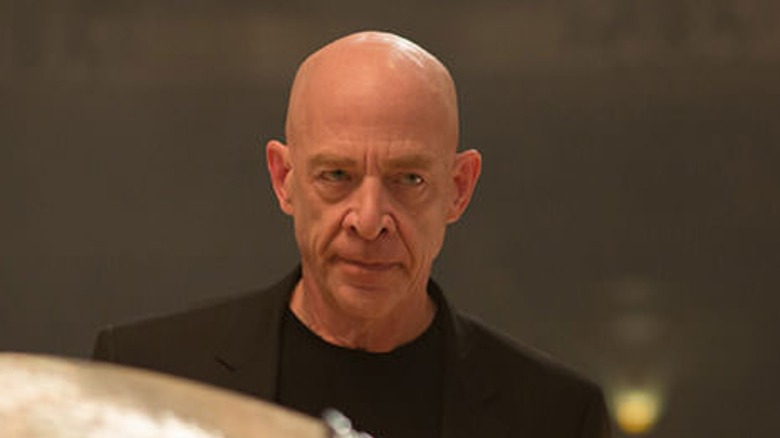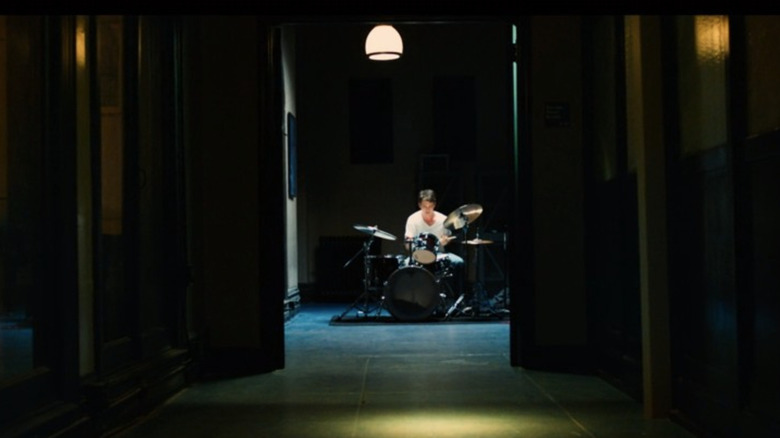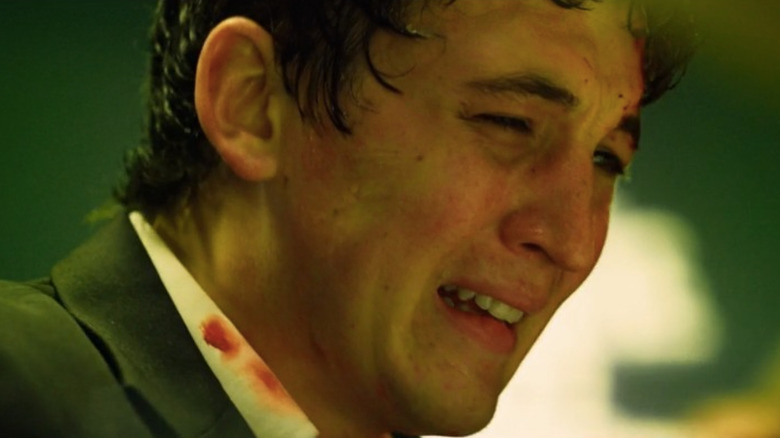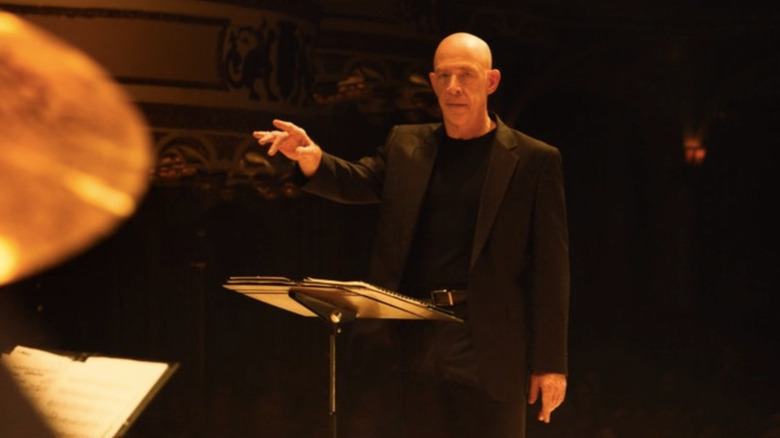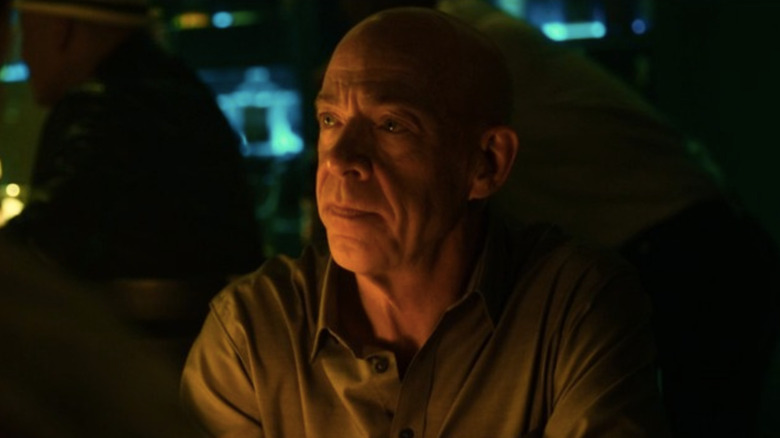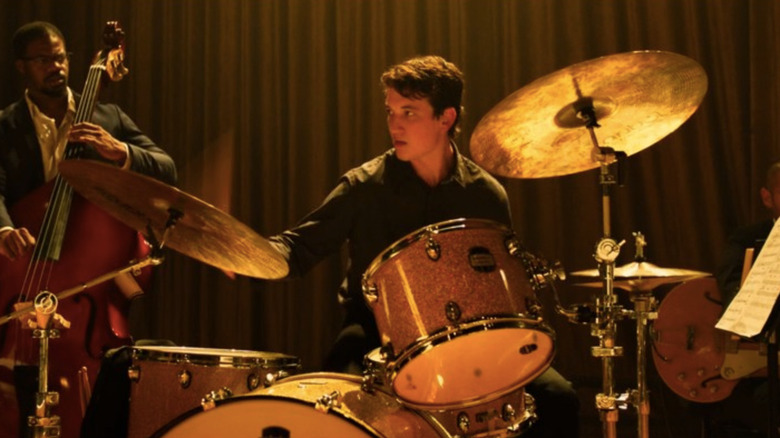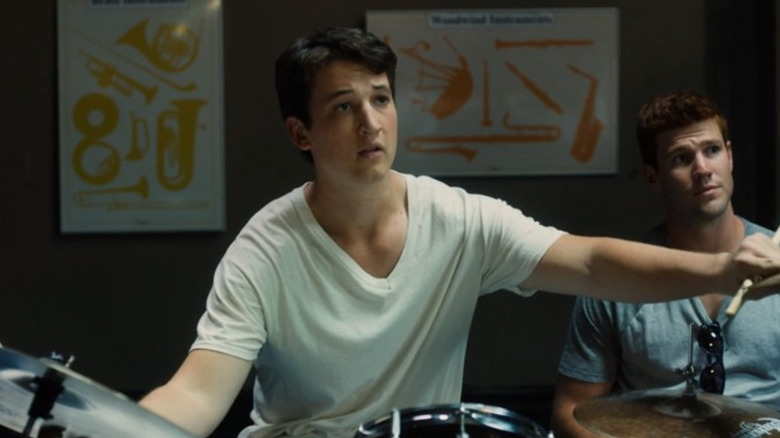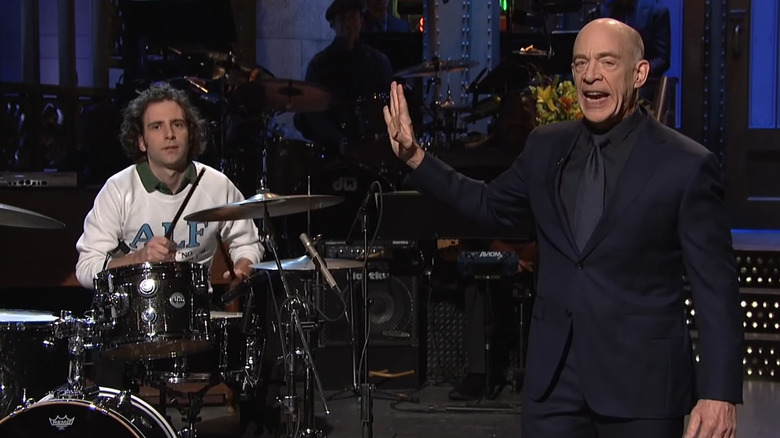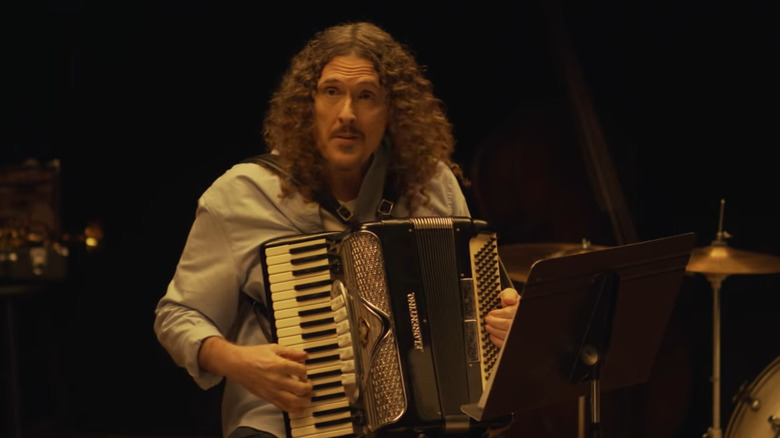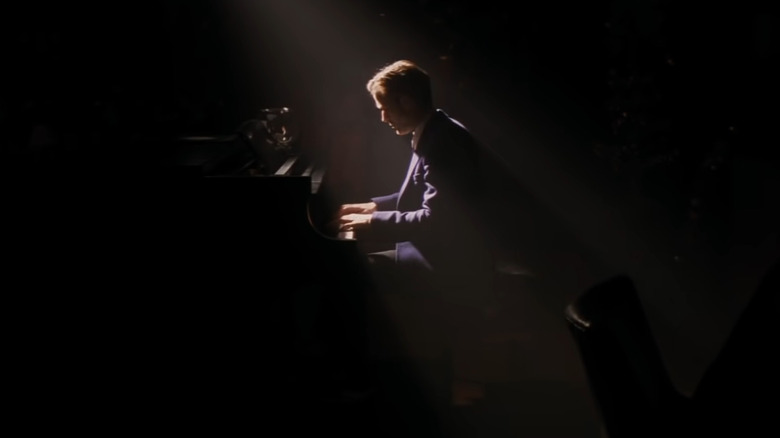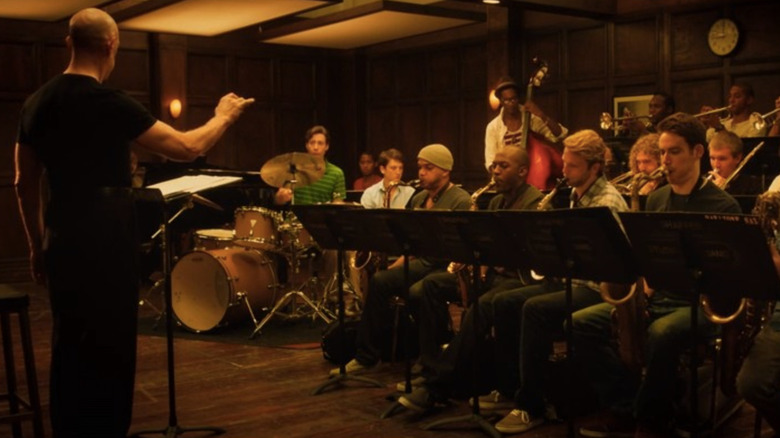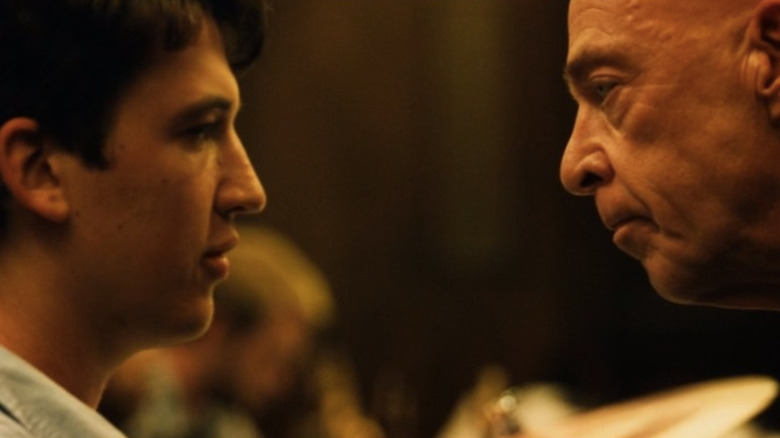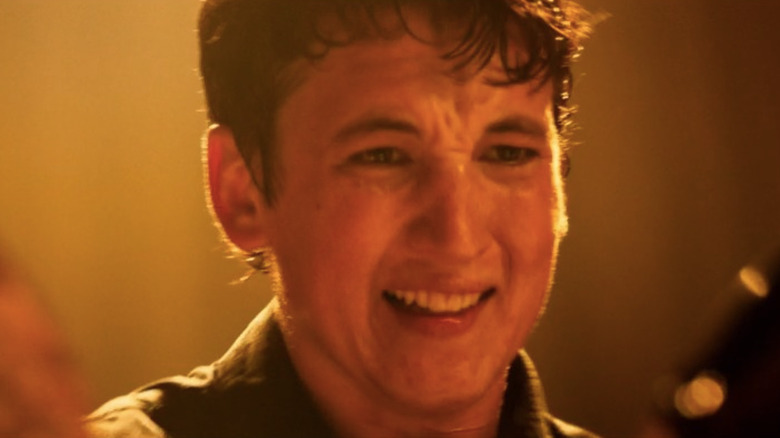The Untold Truth Of Whiplash
Is sacrifice required to achieve greatness, and if so, to what extent? Is art inauthentic if it comes easy? At what point does a demanding coach cross the line from helpful to abusive? These are the big questions "Whiplash" asks its audience as viewers watch the story of Andrew Neiman (Miles Teller), a college student with dreams of being the next great American drummer under the tutelage of his psychotic professor, Terence Fletcher (J.K. Simmons).
The 2014 movie itself faced a production saga, not unlike its characters' journeys. To raise the money to produce "Whiplash," writer and director Damien Chazelle condensed the story into an 18-minute short film, also starring Simmons, per MovieMaker Magazine. With a proof of concept, the film earned its financial backing and went on to achieve critical acclaim and notoriety — with its fair share of twists and turns along the way. Here is the untold truth of "Whiplash."
The opening scene is essentially the entire movie
"Whiplash" writer and director Damien Chazelle intended to begin the movie with a scene of the protagonist, student Andrew Neiman, drumming and his teacher, Fletcher, forcefully coaching his technique — more or less what the ensuing two hours entails. "The story itself is really about the drummer's relationship with the teacher, so that's what the first scene had to be," Chazelle told the University of California Television on YouTube. "It had to introduce the drummer, the teacher, and tell you exactly what that relationship was gonna be. Then the rest of the movie can vary, you know, riff on that theme, but I like the idea of basically having an entire movie within the opening scene of the movie."
There are, of course, many layers to unpack within this dramatic sequence, but the film boils down to its essence in this opening moment. The audience sees a young drummer with a drive to elevate and an older mentor with a knack for pushing that drive to its breaking point, with underlying themes of passion, approval, and identity beneath every beat. In a nutshell, that's "Whiplash."
Neiman's experience is semi-autobiographical for Chazelle
The basis of Andrew Neiman's trajectory in "Whiplash" was inspired by writer/director Damien Chazelle's experience in his high school jazz ensemble. Neiman faces intense pressure to improve his drumming from his borderline-psychotic teacher, who demands perfection, a dynamic that mirrored Chazelle's youth. Chazelle told The Hollywood Reporter that his teacher constantly yelled the phrases, "You're rushing, "You're dragging," and "Not my tempo!" It's familiar verbiage to "Whiplash" viewers who heard these words shouted by Neiman's professor, Fletcher.
One moment in the film sees a semi-truck t-bone Neiman's rental car at an intersection on his way to a performance. Even though the car is wrecked and blood streams down Neiman's face, the concert is all he can think about. He flees the intersection to make it to the show on time, battered and worse for wear. The inspiration for this scene comes from a similar moment in Chazelle's high-school days when he got in a wreck that flipped his car twice and still performed with his jazz ensemble the next day (via The Moveable Fest). In a bizarre twist of fate, a similar incident happened again during the filming of "Whiplash." This time, Chazelle totaled his car in an accident and required a hospital visit. Regardless, he promptly returned to the director's chair the following day, emulating his own creation.
J.K. Simmons shares something in common with his character
When an actor takes on a role with a specific skill set, the audience can't help but wonder how much preparation the actor needs to learn the proper technique so that their performance comes across as effortless for the character they portray. Therefore, as J.K. Simmons plays Fletcher and conducts the jazz band throughout "Whiplash," the logical follow-up question is if he's actually adhering to the correct conducting disciplines. With a movie as meticulous as "Whiplash," the viewer might assume the answer is yes, to which the next question would be about Simmons' training.
Writer and director Damien Chazelle told Interview Magazine the surprising answer. "I thought we'd have to do a lot of research and training to get him up to snuff as a conductor, but he actually had a degree in composition and conducting and singing, and had gone to music school."
Deleted scenes would give a fuller perspective of Fletcher's life
In J.K. Simmons' portrayal of Fletcher, Neiman's commanding conductor, the audience only sees how Fletcher upholds himself — aggressively — around his musicians. Most of Fletcher's personal life is left to the viewer's imagination, but that wasn't always the case. Sequences that were shot but not included in the finished movie showed Fletcher's home life in a way that would have added another layer of dimension to the duality of his character.
"We shot a half a day of scenes in Fletcher's apartment ... where we see just how Spartan his existence is," Simmons told That Shelf. "It's a nice apartment, but the one time we see him, he's drinking a glass of red wine with a frozen microwave dinner eating by himself. He's a sad guy, and the ONLY thing he has in his life is the music." Fletcher puts so much into his work that his life has little room for anything else, whether by choice or nature. While some of this is implied in the scenes that made the final cut, the deleted moments would have provided more context to understand his character.
Whiplash was filmed in less than three weeks
The crew of "Whiplash" knew it wanted actor Miles Teller to play its protagonist. However, Teller's limited availability placed the production on a race against the clock, per The Hollywood Reporter. Between Teller's prior commitments and a deadline for the movie screening at 2014's Sundance Film Festival, "Whiplash" only had a 19-day window to film the entire movie. Furthermore, that left editors only two months to compose the film from the footage.
Moviemaking is not a quick process. For every minute shown in the finished product, there are hours upon hours of preparing the set's lighting and audio, blocking the scene, and capturing take after take of the same lines. To cram a movie as ambitious as "Whiplash" into 19 days of shooting necessitated 18-hour days, with some days containing upwards of 100 setups of individual scenes, an unheard-of lightning pace given the precision of each shot.
Miles Teller couldn't work out during filming
Sometimes an actor has to undergo a strict physical training regimen to prepare for a role that requires their character to be lean, ripped, or otherwise superhuman. In contrast to the bodybuilding prep for some of his other roles, Miles Teller had to intentionally stay away from the gym to match his character's exercise habits in "Whiplash."
"I had just gotten done making the first "Divergent," and for that we had to go to a boot camp and all of the guys and girls there had to be in great shape for all of the fighting we have to do," Teller told That Shelf. For "Whiplash," though, Teller's instructions were decidedly different. "Don't go outside. Don't touch a weight outside of maybe doing some forearm stuff. Just put on some larger shirts than you would normally wear and just let that carry over into how the character carries himself."
These instructions make sense within the context of the story. For starters, Teller's character, Andrew Neiman, is a college freshman, probably prone to the infamous "freshman 15" phenomenon, in which first-year college students typically put on 15 pounds (via Healthline). Someone as focused on perfecting his drumming as Neiman doesn't have time to be concerned with his personal image. To him, any time not spent drumming is time wasted, including visits to the gym. Teller's appearance had to uphold the integrity of that.
J.K. Simmons embodied his inner Fletcher when hosting Saturday Night Live
The wide release of "Whiplash" in 2014 caused a wave of praise for the film and J.K. Simmons, which included Simmons winning an Oscar for Best Supporting Actor and hosting "Saturday Night Live," per Oscars. During his "SNL" appearance, Simmons' opening monologue poked fun at his role as the perfection-obsessed Fletcher by conducting "SNL" cast members Kyle Mooney on the drums to perform a song they wrote together (via YouTube).
While Simmons technically still portrayed a version of himself rather than reprising the role of Fletcher, the two are the same for the purposes of the sketch. Simmons is displeased with Mooney's drumming and begins to degrade him the way Fletcher might yell at students. "This is not your little weird videos, ok? This is the opening of the show," Simmons reprimands Mooney. "Can you get it together? Lose the 'Alf' sweatshirt and the goofy hair. Get on my tempo!" Frustrated, Simmons swaps out Mooney for a parade of substitute drummers, none of whom measure up to Simmons' standards: Pete Davidson, Leslie Jones, and lastly, Fred Armisen in a surprise appearance, the only one of them Simmons deems worthy.
Whiplash gets the parody treatment
As "Whiplash" gained prominence within the zeitgeist of mid-2010s popular culture, a number of artists tried their hand at parodying the film. A video from College Humor on YouTube took existing footage of J.K. Simmons from the film and made it seem like Fletcher was training Weird Al in the art of polka. Try as he might, Weird Al can't match Fletcher's tempo, his abused hands smearing blood on his accordion keys. "Look," Weird Al pleads, "when I said I wanted to be perfect, I didn't mean 'perfect' perfect." Fletcher throws a chair at his head.
The STATION by MAKER created a parody trailer for a fake movie titled "DJ Wh1PLA$H," in which a student endures the rigors of an intense professor who teaches deejaying, not drumming (via YouTube). During a prerecorded introduction to the 2015 Film Independent Spirit Awards, hosts Kristen Bell and Fred Armisen encounter Miles Teller in character as Andrew Neiman from "Whiplash" drumming by himself in a room (via YouTube).
Whiplash is the antithesis of La La Land
Damien Chazelle directed both 2014's "Whiplash" and 2016's "La La Land," which he describes as opposites. "'Whiplash" is about the pain of making music," Chazelle told Interview Magazine, whereas "La La Land" is "much more about the joy of making music." This language perfectly embodies the contrast between the two films. They both have at their center a character — Miles Teller's Andrew Neiman in "Whiplash" and Ryan Gosling's Seb Wilder in "La La Land" — whose obsession with music brings forth a specific outcome in their work. In Andrew's case, it's pain as he chases an elusive idea of perfection, while in Seb's case, it's joy as he seeks to inspire others through his love of jazz. They're two sides of the same coin motivated by different outcomes.
Incidentally, in the same interview from 2014, Chazelle mentioned that Teller was supposed to star in "La La Land." However, this didn't end up happening. If Teller had starred, it would have made the character study of Andrew and Seb even more intricate, as Teller would have essentially played the same role in different universes and varying life circumstances.
The sound mixer faced a unique challenge
With music being such an integral part of "Whiplash," sound mixer Tom Curly worked carefully to ensure everything sounded authentic in each sequence. Per URSA Straps on YouTube, Curly worked on the shoot from its inception. While the music in the film was prerecorded, he and his team wanted to avoid each composition sounding like a CD track. It was essential to maintain what the room sounded like, too. Curly was closely involved in the setup of each scene alongside director Damien Chazelle in a way atypical to the distanced role of most sound mixing projects.
Curly also revealed a bit of moviemaking magic. While they recorded the music separately from shooting, the musicians the audience sees are legitimate experts of their instrument, not actors, so as to maintain an authentic feel. "They all know those instruments specifically," Curly said. "They gave them all the charts ahead of time and they were to learn how to play them, note for note. When we got on set, they would actually do that, but we didn't record their playing for the purposes of using it in the movie."
It would have been impossible for Neiman to follow Fletcher's tempo
During classroom instruction, Fletcher becomes infuriated with Neiman when the student can't emulate his desired tempo on the drums. Fletcher repeatedly claps his hands to the tempo he wants Neiman to drum, but try as he might, Neiman isn't able to get it. In an interview with GQ on YouTube, drummer Thomas Pridgen, examining different drumming moments in the film, said with the quick sample Fletcher provides, Neiman's task is actually impossible.
"Immediately when I watch 'Whiplash,' I laugh," Pridgen said. "The tempo he gives him is so short. No one could catch a tempo if it's that short because you need a little bit of time to get your little dance on to get the tempo right and he gives him no time." Fletcher wasn't just demanding perfection. Knowingly or not, he was asking for the impossible, setting Neiman up to fail the assignment and lose Fletcher's coveted approval.
Audiences' response to the ending surprised the director
"Whiplash" ends somewhat abruptly, immediately after Neiman gives an incredible performance in which he challenges Fletcher for control over the orchestra in real-time in front of an auditorium of people. At first, Fletcher is confused and embarrassed but then goes with it. What follows is an imbalance of a long-established scale between a pupil and a mentor as the two men battle for the power of the stage, with Neiman arguably winning. Just as the performance ends, the camera cuts to black, and the credits begin rolling. There's no epilogue, no follow-up.
Director Damien Chazelle left the movie's conclusion somewhat open but told Roger Ebert that he thought the audience would interpret it as more "tragic" than "triumphant." However, the opposite occurred more often than Chazelle expected. He thought audiences would be sad that Neiman essentially becomes a version of Fletcher, signaling a lifetime of emptiness ahead of him. Instead, Chazelle seems to experience more viewers who lean toward considering the ending a glass-half-full situation, with Neiman achieving the success he dreamed of while simultaneously besting the man who manipulated and abused him.
